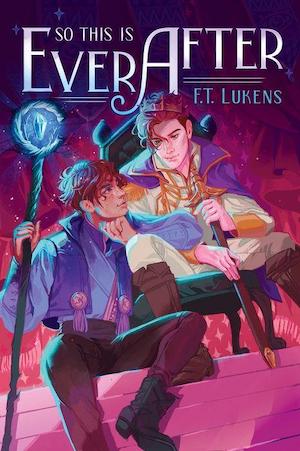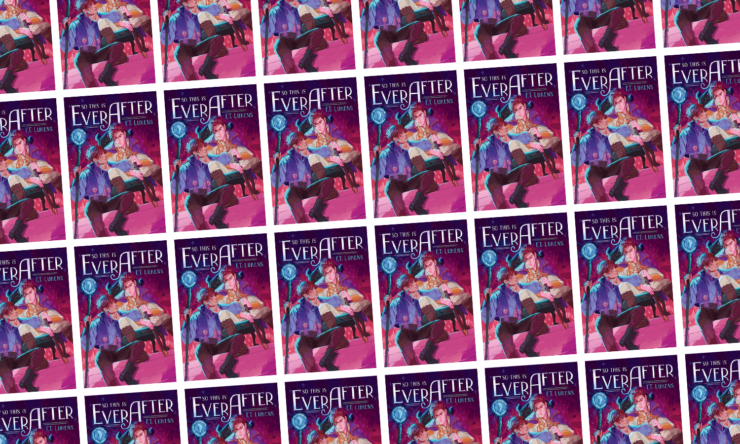A group of teens are united by an ancient prophecy to help the Chosen One slay the wicked king and restore peace to their kingdom. But the story doesn’t start there. No, F.T. Lukens starts So This Is Ever After once the evil is defeated. This is what comes after “The End.”
Arek, a former village boy with an unexceptional life finds himself crowned king. The rest of his troupe, bard Bethany, knight Rion, elf rogue Lila, warrior Sionna, and mage Matt, become his royal council, and that’s when things get tricky. Two spells bind young Arek to the throne, one that says only death can end his reign and another that says if he doesn’t marry by his 18th birthday he’ll die. Arek, being the romantic he is, wants to marry for love rather than duty. And who he really wants to marry is his oldest and dearest friend, Matt. Trouble is, Arek is terrified of putting Matt into a position of obligation or loyalty instead of true love.
Believing Matt doesn’t return his feelings, Arek convinces him to help him woo his friends instead, thinking that at least he can marry someone he has a connection with, even if it’s only platonic. Along the way, Arek and company have to figure out how to run a kingdom newly freed from the clutches of an authoritarian ruler, prevent war with the pissed off and more powerful neighboring kingdoms, and appease the once oppressed subjects to keep them from fracturing into civil war. No easy task for anyone, much less a group of semi-feral teens running mostly on instinct and hormones.
Buy the Book


So This Is Ever After
In a delightful twist, there is no villain in So This Is Ever After. The Big Bad is dispatched on the first page; there are a couple more threats to King Arek’s life, but there is no central villainous figure. All of the plot tension stems from Arek trying and failing to find his soulmate. There are a couple of action set pieces—which Lukens is always great at describing—but overall this is a softer, slower story. This offers a lot more room for some much needed and thoroughly engaging introspection and revelation.
As the story unfolds, Lukens weaves queerness directly into the worldbuilding. Same-sex married lords and ladies appear at court, as do nonbinary squires and lesbian maids. Arek himself is bi/pan, while his bard Bethany is poly. Lukens seems to add more queerness into each subsequent book they write, and as a queer and genderqueer fan of fantasy, romance, and fantasy romance, I’m so here for it.
Most readers will see the ending coming a mile away. As per usual with romance, this book is about the journey more than the destination. In romance fiction, predictability isn’t as much of an issue as it is in other genres. I love (pun intended) knowing the beats of a romance novel. I know that at [x] point in the novel [y] has to happen which will lead to [z], and everything is tied up in a neat little HEA/HFN (“happily ever after” and “happily for now,” respectively) bow. How the author plays with the formula, how they subvert or lean into it, and how they transform or trope-ify it, is one of the main selling points. Lukens’ novel is predictable, but, again, that’s not a bad thing, given its subgenre. Because we know our love interests need to find their way to each other in the end, we can enjoy their character development and emotional discovery that much more.
As with Lukens’ other second world YA fantasy romance, last year’s enchanting In Deeper Waters, So This Is Ever After leans heavy on the contemporary-isms. The names are fairly modern, and the teens have conversations about consent, post traumatic stress, and romance and fantasy tropes. I don’t think the story would have been half as entertaining if they had written it to sound like a medieval fantasy, and the characters would have been as dry and plain as parchment paper. The playful, contemporary tone takes a nice story about two adorable, emotionally constipated walnuts and makes it soar.
F.T. Lukens’ So This Is Ever After is like a cupcake meant to be savored. And savor it I did. Sweet without being cloying, charming without being twee, enjoyable without overstaying its welcome, and wonderfully queer, this novel is everything I love about YA fantasy romance. Reading it made me feel all warm and fuzzy inside, like finding a great brunch place or hanging out at the park on a sunny spring afternoon. There are only a few authors whose books I wish I could go back and read again for the first time, and Lukens is one of them.
So This Is Ever After is published by Margaret K. McElderry
Alex Brown is an Ignyte award-winning critic who writes about speculative fiction, librarianship, and Black history. Find them on twitter (@QueenOfRats), instagram (@bookjockeyalex), and their blog (bookjockeyalex.com).










